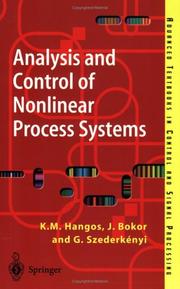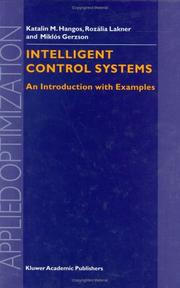| Listing 1 - 5 of 5 |
Sort by
|

ISBN: 1280189479 9786610189472 185233861X 1852336005 Year: 2004 Publisher: London : Springer London : Imprint: Springer,
Abstract | Keywords | Export | Availability | Bookmark
 Loading...
Loading...Choose an application
- Reference Manager
- EndNote
- RefWorks (Direct export to RefWorks)
Almost all process systems are nonlinear in nature. Nonlinear control is traditionally an area of interest in process systems engineering which is of great practical importance. These facts notwithstanding, many process engineers have difficulty with the paradigms and results of modern nonlinear control theory because they lack the mathematical background usually associated with such methods or because of their computational difficulty and small-scale applicability in the general case. Analysis and Control of Nonlinear Process Systems overcomes these barriers. Features: • The necessary mathematical preliminaries for readers from a process engineering background. • Constant reference to the widely-known finite-dimensional linear time-invariant continuous case as a basis for extension to the nonlinear situation. • The most promising theories and analytical methods for nonlinear process control laid out clearly and straightforwardly with exercises to reaffirm the techniques as they are taught. • Emphasis on the importance of process knowledge and first-principles-based models in obtaining feasible and effective solutions in particular circumstances from general cases. • Illustration of applications with simple examples and case studies. Analysis and Control of Nonlinear Process Systems will interest graduate process engineers wishing to study advanced control methods either with a view to further research or application in industry as well as to academics seeking to move process control courses into more complicated but up-to-date territory. It will also be a great assistance to those in their senior undergraduate years who will form the next generation of industrial process engineers and need unfussy access to the most modern nonlinear control ideas.
Process control. --- Nonlinear control theory. --- Differentiable dynamical systems. --- Computer engineering. --- Chemical engineering. --- Systems theory. --- Industrial engineering. --- Dynamical Systems and Ergodic Theory. --- Electrical Engineering. --- Control and Systems Theory. --- Industrial Chemistry/Chemical Engineering. --- Systems Theory, Control. --- Industrial and Production Engineering. --- Dynamics. --- Ergodic theory. --- Electrical engineering. --- Control engineering. --- System theory. --- Production engineering. --- Manufacturing engineering --- Process engineering --- Industrial engineering --- Mechanical engineering --- Management engineering --- Simplification in industry --- Engineering --- Value analysis (Cost control) --- Systems, Theory of --- Systems science --- Science --- Chemistry, Industrial --- Engineering, Chemical --- Industrial chemistry --- Chemistry, Technical --- Metallurgy --- Control engineering --- Control equipment --- Control theory --- Engineering instruments --- Automation --- Programmable controllers --- Electric engineering --- Ergodic transformations --- Continuous groups --- Mathematical physics --- Measure theory --- Transformations (Mathematics) --- Dynamical systems --- Kinetics --- Mathematics --- Mechanics, Analytic --- Force and energy --- Mechanics --- Physics --- Statics --- Philosophy --- Automatic control.
Book
ISBN: 0128154969 0128154950 9780128154960 9780128154953 Year: 2018 Publisher: London, United Kingdom : Academic Press, an imprint of Elsevier,
Abstract | Keywords | Export | Availability | Bookmark
 Loading...
Loading...Choose an application
- Reference Manager
- EndNote
- RefWorks (Direct export to RefWorks)
Nonlinear systems. --- Polynomials. --- Algebra --- Systems, Nonlinear --- System theory

ISBN: 0306480816 1402001347 Year: 2001 Publisher: Boston, MA : Springer US,
Abstract | Keywords | Export | Availability | Bookmark
 Loading...
Loading...Choose an application
- Reference Manager
- EndNote
- RefWorks (Direct export to RefWorks)
Intelligent control is a rapidly developing, complex and challenging field with great practical importance and potential. Because of the rapidly developing and interdisciplinary nature of the subject, there are only a few edited volumes consisting of research papers on intelligent control systems but little is known and published about the fundamentals and the general know-how in designing, implementing and operating intelligent control systems. Intelligent control system emerged from artificial intelligence and computer controlled systems as an interdisciplinary field. Therefore the book summarizes the fundamentals of knowledge representation, reasoning, expert systems and real-time control systems and then discusses the design, implementation verification and operation of real-time expert systems using G2 as an example. Special tools and techniques applied in intelligent control are also described including qualitative modelling, Petri nets and fuzzy controllers. The material is illustrated with simple examples taken from the field of intelligent process control.
Computer science. --- Special purpose computers. --- Software engineering. --- Artificial intelligence. --- System theory. --- Control engineering. --- Computer Science. --- Artificial Intelligence (incl. Robotics). --- Control. --- Systems Theory, Control. --- Software Engineering/Programming and Operating Systems. --- Special Purpose and Application-Based Systems. --- Control engineering --- Control equipment --- Control theory --- Engineering instruments --- Automation --- Programmable controllers --- Systems, Theory of --- Systems science --- Science --- AI (Artificial intelligence) --- Artificial thinking --- Electronic brains --- Intellectronics --- Intelligence, Artificial --- Intelligent machines --- Machine intelligence --- Thinking, Artificial --- Bionics --- Cognitive science --- Digital computer simulation --- Electronic data processing --- Logic machines --- Machine theory --- Self-organizing systems --- Simulation methods --- Fifth generation computers --- Neural computers --- Computer software engineering --- Engineering --- Special purpose computers --- Computers --- Informatics --- Philosophy --- Computers, Special purpose. --- Automatic control.
Book

ISBN: 9789633865668 9633865662 Year: 1997 Publisher: Budapest New York
Abstract | Keywords | Export | Availability | Bookmark
 Loading...
Loading...Choose an application
- Reference Manager
- EndNote
- RefWorks (Direct export to RefWorks)
The shift to a market economy in post-communist Eastern Europe has had a profound impact on science and scientists across the region, leading to reforms in research management practices and to drastic cuts in funding levels everywhere. Many countries are moving to a system of competitive research grants awarded on the basis of peer review. The introduction of peer review is not simply a technical matter. It signifies a fundamental change in the social structure of science, enhancing profession-al autonomy and giving working scientists a voice in the allocation of resources. This book combines first-hand accounts of the reform process with analyses of the strengths and weaknesses of both peer review and quantitative indicators.
Research --- Peer review of research grant proposals --- Science --- Science research --- Scientific research --- Information services --- Learning and scholarship --- Methodology --- Research teams --- Grant proposals, Peer review of --- Proposals for research grants, Peer review of --- Research grant proposals, Peer review of --- Review of research grant proposals, Peer --- Research grants --- Evaluation --- Finance --- Central and Eastern Europe, Ethics, Late 20th century, Postcommunism, Ranking, Science policy, US.
Digital

ISBN: 9789633865668 Year: 1997 Publisher: Budapest ;; New York Central European University Press
Abstract | Keywords | Export | Availability | Bookmark
 Loading...
Loading...Choose an application
- Reference Manager
- EndNote
- RefWorks (Direct export to RefWorks)
| Listing 1 - 5 of 5 |
Sort by
|

 Search
Search Feedback
Feedback About UniCat
About UniCat  Help
Help News
News